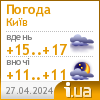A few excerpts:
"I believe that, if offered the choice, most Ukrainians would choose a future tied to the West. But many Ukrainians believe that they have been denied this very choice. ... As Zbigniew Brzezinski wisely remarked, with Ukraine subordinated, Russia automatically becomes an empire. ... The people of Ukraine are free individuals whose democratic rights are under attack. In his most famous work, the great Ukrainian poet Taras Shevchenko wrote of his desire for Ukrainian independence, hoping that one day his countrymen would join "the family of the free." The people of Ukraine have achieved this dream, and they have grasped their democratic rights. The question now is whether this love of freedom and democracy is limited to the Ukrainian people, or whether their rulers embrace it as well."
Full article:
Washington Post
http://www.washingtonpost.com/wp-dyn/articles/A43718-2004Oct18.htmlA Crucial Choice for Ukraine
By John McCainTuesday, October 19, 2004; Page A23
One election this year will determine the political destiny of a vitally important country, define its international orientation and test its democratic credentials. I do not refer to the recent free elections in Afghanistan, or the elections next year in Iraq or even our own presidential race. All these are critical in their own right, but so is Ukraine's historic step on Oct. 31. When the Ukrainian people line up that day to select a new president, the world will be watching.
The importance of this election lies not so much in the candidate selected but rather in its indication of whether Ukraine will continue down a democratic path. So far the prospects appear dim. President Leonid Kuchma is retiring, and the two front-runners in the race to replace him are Prime Minister Viktor Yanukovych and opposition candidate Viktor Yushchenko. The Ukrainian government has used its tax laws to target Yushchenko and other opposition candidates, denied the opposition equal access to the media, disrupted campaign events, and intimidated candidates and their supporters. Most recently, Yushchenko survived a suspected poisoning that left his face partially paralyzed. In August I traveled to Ukraine to talk to government officials and opposition candidates. What I found was a sense that Ukraine was moving backward, not forward, on the road to democracy. Not only were the reports of intimidation against the opposition widespread, but there was also a pervasive expectation that the October election -- and the second-round runoff three weeks later -- will be rigged by the government. Already a local election in western Ukraine has been stolen, and there have been balloting irregularities in other local elections.
These developments are disturbing not just because they abridge the political rights of the Ukrainian people but because they cast a shadow over the country's international orientation. Should the government continue this crackdown on the opposition and rig the presidential election, Ukraine's relations with the United States and Europe will inevitably suffer. And if our relations deteriorate, we risk Ukraine slipping further into the Russian orbit. I believe that, if offered the choice, most Ukrainians would choose a future tied to the West. But many Ukrainians believe that they have been denied this very choice: While the West's door seems closed -- neither NATO nor the European Union has offered Ukraine much hope of joining their organizations anytime soon -- Russia's is always open. It would not be surprising if Ukrainian leaders increasingly aligned their country's ambitions with those of their Russian neighbors. As Zbigniew Brzezinski wisely remarked, with Ukraine subordinated, Russia automatically becomes an empire. So it is incumbent upon both the Western democracies and the government of Ukraine to reassess where things stand today. The Ukrainian government must end its siege of democracy and make the courageous choice to hold free, fair elections. If it does so, the United States and Europe should pursue an enhanced relationship with Ukraine, looking hard at its eventual membership in NATO and the European Union, expanding our bilateral relations, and determining ways to enhance the trading relationship. Ukrainian officials must understand that more than their country's future is at stake in this election. Their reputations and their ability to conduct business are also at risk. If the oppression continues and this presidential election is stolen, the United States and Europe should institute visa bans against those responsible. These would not merely limit the ability of these officials to go skiing abroad; the visa bans would handicap their ability to conduct business in Europe and the United States. The Western democracies should also consider implementing other targeted penalties. If Ukraine's leaders wish to take their country further in the direction of Belarus, then they will be increasingly treated by the world like the leader of Belarus -- an international pariah. This outcome is entirely avoidable, but we should be prepared to move in that direction if necessary. The people of Ukraine are free individuals whose democratic rights are under attack. In his most famous work, the great Ukrainian poet Taras Shevchenko wrote of his desire for Ukrainian independence, hoping that one day his countrymen would join "the family of the free." The people of Ukraine have achieved this dream, and they have grasped their democratic rights. The question now is whether this love of freedom and democracy is limited to the Ukrainian people, or whether their rulers embrace it as well. The writer is a Republican senator from Arizona.




No comments:
Post a Comment
Feel free to leave your comments and reactions here.